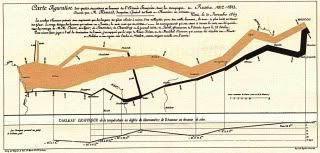Showing posts with label knowledge management. Show all posts
Showing posts with label knowledge management. Show all posts
Thursday, April 29, 2010
ATP Metabolism
And on the subject of overwhelming biological data, this is the IUBMB-Nicholson chart of all the metabolic pathways that go into ATP management in mitochondria and chloroplasts, ATP being the basic energy currency of biological systems. There's a browser-crashing full sized pdf at the link, or click the above thumbnail for a jpg.
Labels:
biology,
compbio,
knowledge management
Monday, March 1, 2010
The Grande Armée Invades Russia
Charles Joseph Minard was a mathematician, a civil engineer, and a pioneer in the field of information graphics; his most famous work is the above chart, which he created in 1869. It tells the tale of Napoleon's disastrous invasion of Russia in 1812: The width of the line represents the size of the Grande Armée from the crossing of the Niemen river to the deserted streets of Moscow and back, with temperatures during the return trip plotted along the bottom. At its peak, the Grand Armée numbered 690,000 men (422,000 at the start of this invasion), and was the largest army assembled to that point in European history.
Labels:
history,
knowledge management
Friday, August 28, 2009
TinEye

TinEye is a reverse image search engine-- ie you upload a picture from your computer and it'll look for sites that use that picture. Seems to work pretty well, though sadly it was unable to tell me where the above picture came from-- it's been sitting orphaned on my PC for ages. Their Cool Searches page shows some examples of what the site is capable of in terms of image recognition-- impressive stuff. Similar to this, Google has a Similar Images search function, which seems to work pretty well but doesn't seem to support searching uploaded images so far.
Hmm, I wonder what it'd take to make a content search for music-- I'm not sure how input to the search would work, but it'd be an interesting project just to study feature/melody extraction from mp3s. Most music has some sort of regular structure: could you automatically find the hook or the chorus of a pop song? Maybe make a filter that converts complex orchestral sound to pure tones, or even generates sheet music from sound files? Time to do some digging.
Labels:
art,
art resources,
knowledge management,
technology
Thursday, August 20, 2009
Google News timelines
So I've just discovered Google News has an Archive Search feature, which lets you search historical news articles for a given phrase and return a histogram of hits. It makes an interesting way to map the rise and fall of concepts, events, and phrases in the public mind. Here are some queries I've come across that have interesting patterns:
First, some normalization: a search for the, and, a, etc gives us an estimate of the number of articles on record-- gradual uphill increases like those seen here should be attributed to the nature of the data set and not the data itself. (Science!)
There's lots of modern words and phrases we can watch grow into popularity, like outer space and DNA. More subtly, we see the emergence of the adjective global starting in the 1940's, and a sudden rise in popularity of the word deadly in the 1980's (wut?). Robot grows gradually in use over the 20th century, though there is a funny spike in the summer of 1944, which correlates to German use of "robotic" planes to bomb Britain during WW2. And atom shows a boom midway through 1945, of course, though it's curious to note that its appearance in the news is deminished prior to that, during the war-- this could be a result of wartime news censorship, but then if you search science itself, you see that science reporting in general tends to drop during wartime, which could also be a factor.
Then some words are tied to a certain time period-- like fallout shelter and elixir. Others fall from popularity: for some odd reason, the word obituary became wildly unpopular in 1986, while the civil rights movement (I assume) soundly quashed use of the word negro after the late 60's. And lipstick, after rising in popularity starting in the roaring 20's (a phrase which didn't actually take off 'til the 60's-- does that mean 20's culture was to the 60's what baby boomer culture is to the 90's/today?), lipstick suffered a temporary blow in the 1970's, either from the growth of the feminist movement or simply from the fashion of the time.
What other trends are out there?
First, some normalization: a search for the, and, a, etc gives us an estimate of the number of articles on record-- gradual uphill increases like those seen here should be attributed to the nature of the data set and not the data itself. (Science!)
There's lots of modern words and phrases we can watch grow into popularity, like outer space and DNA. More subtly, we see the emergence of the adjective global starting in the 1940's, and a sudden rise in popularity of the word deadly in the 1980's (wut?). Robot grows gradually in use over the 20th century, though there is a funny spike in the summer of 1944, which correlates to German use of "robotic" planes to bomb Britain during WW2. And atom shows a boom midway through 1945, of course, though it's curious to note that its appearance in the news is deminished prior to that, during the war-- this could be a result of wartime news censorship, but then if you search science itself, you see that science reporting in general tends to drop during wartime, which could also be a factor.
Then some words are tied to a certain time period-- like fallout shelter and elixir. Others fall from popularity: for some odd reason, the word obituary became wildly unpopular in 1986, while the civil rights movement (I assume) soundly quashed use of the word negro after the late 60's. And lipstick, after rising in popularity starting in the roaring 20's (a phrase which didn't actually take off 'til the 60's-- does that mean 20's culture was to the 60's what baby boomer culture is to the 90's/today?), lipstick suffered a temporary blow in the 1970's, either from the growth of the feminist movement or simply from the fashion of the time.
What other trends are out there?
Thursday, April 23, 2009
Kurzweil Reading Machine
Huh, I never knew this: according to a profile of Ray Kurzweil in Wired, the LexisNexis database-- now an enormous resource with extensive corporate, legal, and academic use-- grew out of a late 70's venture using Kurzweil's recently-developed character-recognition algorithms to scan legal documents and news articles.
Said character-recognition algorithms are a part of a text-to-speech tool Kurzweil continues to refine; its current incarnation is a software package for Nokia phones which will read aloud to you when held above a page.
Said character-recognition algorithms are a part of a text-to-speech tool Kurzweil continues to refine; its current incarnation is a software package for Nokia phones which will read aloud to you when held above a page.
Labels:
knowledge management,
mad science,
technology
Subscribe to:
Posts (Atom)

